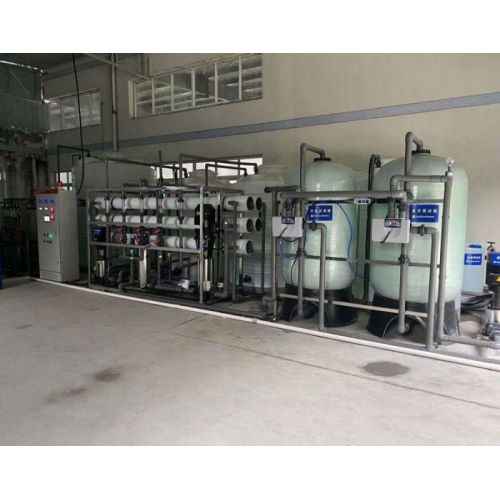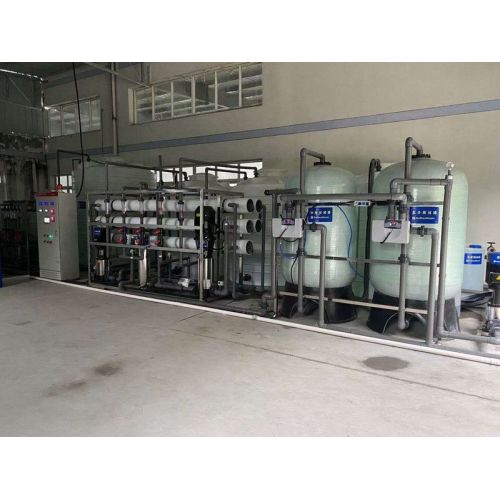
EDI Ultrapure Water Purification Machine
- Min. Order:
- 1 Set/Sets
- Min. Order:
- 1 Set/Sets
- Transportation:
- Ocean, Land
- Port:
- Shanghaigang
Quantity:
Your message must be between 20 to 2000 characters
Contact NowBasic Info
Basic Info
| Place of Origin: | China Jiangsu |
|---|---|
| Productivity: | 200 sets |
| Supply Ability: | Annual output of 200 sets of water treatment equipment or even more |
| Payment Type: | L/C,T/T |
| Incoterm: | FOB,CIF |
| Certificate: | AAA certification |
| Transportation: | Ocean,Land |
| Port: | Shanghaigang |
Product Description
Product Description
Product Description
EDI ultrapure water treatment equipment: EDI ultrapure water equipment, continuous electrodeionization (Electrodeionization), EDI for short, is a pure water manufacturing technology that combines ion exchange technology, ion exchange membrane technology and ion electromigration technology. It is a high-tech green environmental protection technology.
EDI ultrapure water treatment equipment has the advantages of continuous water output, no need for acid and alkali regeneration, and unattended. It has gradually replaced the mixed bed as a finishing equipment in the system for preparing pure water.
EDI ultrapure water treatment equipment has good environmental protection characteristics, easy operation and use, and is more and more recognized by people, and it is also more and more widely promoted in the pharmaceutical, electronic, electric, chemical and other industries.
The working principle of EDI ultrapure water treatment equipment:
Electrodeionization (EDI) system is mainly under the action of direct current electric field, the directional movement of the dielectric ions in the water through the separator, and the selective permeation of the ions by the exchange membrane is a scientific water treatment technology to purify the water quality. . Between a pair of electrodes of an electrodialyzer, there are usually multiple sets of anion membrane, cation membrane and separators (A, B) alternately arranged to form a dense chamber and a weak chamber (that is, cations can pass through the cation membrane, and anions can pass through the anion membrane). The cations in the water in the depleted compartment migrate to the negative electrode through the positive membrane, and are intercepted by the negative membrane in the thick chamber; the anions in the water migrate to the positive electrode in the negative membrane and are intercepted by the positive membrane in the thick compartment, so that the number of ions in the water passing through the depleted compartment gradually decreases. It becomes fresh water, and the water in the thick room, due to the continuous influx of anions and cations in the thick room, the concentration of dielectric ions continues to rise, and becomes concentrated water, so as to achieve the purpose of desalination, purification, concentration or refining.
Advantages of EDI ultrapure water treatment equipment:
1. No need for acid-base regeneration: the resin in the mixed bed needs to be regenerated with chemicals acid-base, and EDI eliminates the processing and heavy work of these harmful substances. Protect the environment.
2. Continuous and simple operation: In the mixed bed, the operation process becomes complicated due to each regeneration and water quality change, while the water production process of EDI is stable and continuous, and the water quality is constant without complexity The operation procedure is greatly simplified.
Reduced installation requirements: EDI system has a smaller volume than a mixed bed with a considerable amount of processed water. It adopts a modular structure and can be flexibly constructed according to the height and scent of the site. Modular design makes EDI easy to maintain during production work.

EDI ultrapure water treatment equipment has the advantages of continuous water output, no need for acid and alkali regeneration, and unattended. It has gradually replaced the mixed bed as a finishing equipment in the system for preparing pure water.
EDI ultrapure water treatment equipment has good environmental protection characteristics, easy operation and use, and is more and more recognized by people, and it is also more and more widely promoted in the pharmaceutical, electronic, electric, chemical and other industries.
The working principle of EDI ultrapure water treatment equipment:
Electrodeionization (EDI) system is mainly under the action of direct current electric field, the directional movement of the dielectric ions in the water through the separator, and the selective permeation of the ions by the exchange membrane is a scientific water treatment technology to purify the water quality. . Between a pair of electrodes of an electrodialyzer, there are usually multiple sets of anion membrane, cation membrane and separators (A, B) alternately arranged to form a dense chamber and a weak chamber (that is, cations can pass through the cation membrane, and anions can pass through the anion membrane). The cations in the water in the depleted compartment migrate to the negative electrode through the positive membrane, and are intercepted by the negative membrane in the thick chamber; the anions in the water migrate to the positive electrode in the negative membrane and are intercepted by the positive membrane in the thick compartment, so that the number of ions in the water passing through the depleted compartment gradually decreases. It becomes fresh water, and the water in the thick room, due to the continuous influx of anions and cations in the thick room, the concentration of dielectric ions continues to rise, and becomes concentrated water, so as to achieve the purpose of desalination, purification, concentration or refining.
Advantages of EDI ultrapure water treatment equipment:
1. No need for acid-base regeneration: the resin in the mixed bed needs to be regenerated with chemicals acid-base, and EDI eliminates the processing and heavy work of these harmful substances. Protect the environment.
2. Continuous and simple operation: In the mixed bed, the operation process becomes complicated due to each regeneration and water quality change, while the water production process of EDI is stable and continuous, and the water quality is constant without complexity The operation procedure is greatly simplified.
Reduced installation requirements: EDI system has a smaller volume than a mixed bed with a considerable amount of processed water. It adopts a modular structure and can be flexibly constructed according to the height and scent of the site. Modular design makes EDI easy to maintain during production work.

Related Keywords
Related Keywords












